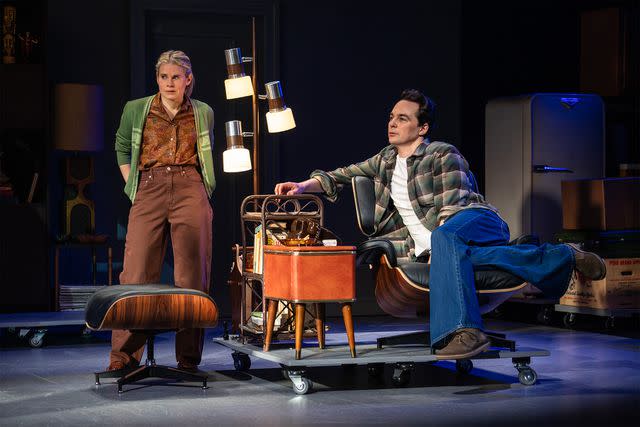“Mother Play” review: Jim Parsons gives standout performance in predictable story
The new work by playwright Paula Vogel ("How I Learned to Drive") also stars Jessica Lange and Celia Keenan-Bolger.
First of all, it feels like we could’ve taken another crack at this title. A play about a mother and her relationship to her children, and it’s just called Mother Play? There’s minimalism, and then there’s calling Moby-Dick “Whale Book.” This complaint isn’t incidental, but indicative of how the new work by esteemed playwright Paula Vogel excels in some aspects, but feels incomplete in other regards.
Jessica Lange stars as Phyllis, the titular mother, who has recently separated from her cheating husband when the play opens in 1964. The only other actors in the production are Jim Parsons and Celia Keenan-Bolger (To Kill a Mockingbird), who play her children Carl and Martha. Like all of us, Phyllis is a product of her time and place. Born to Depression-era parents in the South, she is deeply entrenched in early heteronormative expectations around marriage, family, and education (she was told by her mother that “the filthier a woman’s floor is, the higher her degree” in a pejorative way) even though Phyllis’ own experience with traditional marriage is her philandering husband leaving her to raise two children on her own. She’s so set in her ways that she can’t even imagine that her son (who dreams of being a regular at the Algonquin Round Table) and her daughter (who dresses in flannel and pants to avoid the unwanted attention of groping men on the bus) might have different ideas about life and sex.

Joan Marcus
Celia Keenan-Bolger as Martha and Jim Parsons as Carl in 'Mother Play'The family’s poverty is depicted creatively by director Tina Landau: To mark their entrance into their new home, the stage opens covered in furniture, which the actors themselves move around and unpack. One of them even starts hidden behind a recliner, which makes for a delightfully dramatic entrance. That early apartment turns out to be infested, but Landau depicts the pests with creative shadow puppetry. It’s likely you’ll never be so pleased to see a roach in real life as the ones that show up here.
The subtitle of Mother Play is “A Play in Five Evictions,” and the story (which stretches from the mid-’60s to the present day) is structured by various moves in and out of different apartments. This helps mark the passage of time and the ever-changing nature of the familial relationships, but gets a little confusing when some happen in quick succession — and especially so when another countdown (the amount of martinis Phyllis drinks at a post-graduation celebration) suddenly enters the mix.
Parsons is the standout here. It’s awesome as always to see the actor use his post-Big Bang Theory security to be a prolific Broadway actor, and his performance is so funny, charming, and moving (look out for one riveting monologue where he explains his sexuality by imagining himself as Anastasia Romanov in the midst of the Russian Revolution) that you really feel his absence after Carl moves away to college and embraces the counterculture that Phyllis hates so much. Keenan-Bolger has the least flashy role, serving as narrator and emotional sounding-board for both of the other characters, but really gives the play its heart.
Lange is as good as you might expect playing an embittered aging woman pained by the way society has brushed her aside, but her performance isn’t powerful enough to justify some of Vogel’s creative risks. After Phyllis succeeds in alienating both her children for a time, there comes a scene that is just Lange alone on stage for several minutes, puttering around her apartment. It's obviously meant to illustrate the loneliness of this woman who wasn't given many choices in life and still can't help making the wrong ones over and over again, but it doesn't take long to make that point. The scene gets boring very quickly.

Joan Marcus
Jessica Lange as Phyllis in 'Mother Play'In addition to her years of teaching playwriting at Brown and Yale, Vogel is best-known for her Pulitzer-winning 1997 play How I Learned to Drive, which finally made it to Broadway in 2022 and remains unquestionably one of the very best works of recent American theater. That’s a hard standard to match, especially since the various twists and turns are almost impossible to predict when watching How I Learned to Drive for the first time. By contrast, Mother Play probably isn’t the first story you’ve ever seen about American parents failing to understand their children during the ‘60s and '70s. Some creative choices don’t pay off, but Vogel’s latest hits the emotional beats it needs to, and is certainly a powerful reminder to call your mom now and then. B–
Related content:
Read the original article on Entertainment Weekly.
